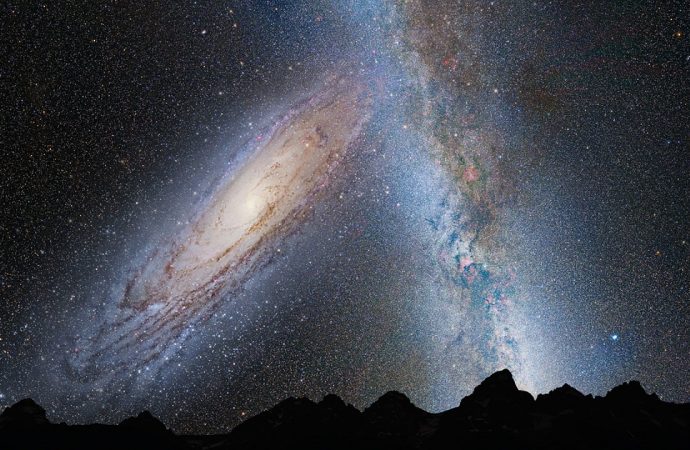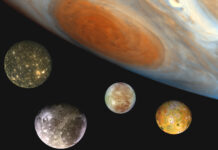Most likely, we are not the only living creatures in the vast Universe that surrounds us. Searching for extraterrestrial life is just one of the countless dimensions of human curiosity.
After the publication of his third book, The Search for Extra Terrestrial Life, Bangladeshi writer Obaidur Rahman set out to discuss with UA Magazine the possibilities of life beyond our planet, the colonialist mindset so often used when discussing space exploration, how could we establish contact with extraterrestrial entities and much more.
Looking beyond terrestrial frontiers
[UA] Throughout the years, many scientists have faced great disbelief in their fields of study. Galileo Galilei is just one of the examples mentioned in your book. Would you say that the search for extraterrestrial life is seen with disbelief by most people or, on the contrary, people are more open to accept the importance of looking beyond our own planet?
[Obaidur Rahman] I think that most people who have received formal education believe, at least at some level, on the possibility of Extra-Terrestrial Life (ETL). In this day and age, with all the scientific and technological advances we have made, it is fairly difficult to hold on to the idea that life exits only on planet Earth.
The increasing amount of people who nourish the idea of extraterrestrial life can be, in part, explained by the fact that citizens are now allowed to think for themselves, more than ever before. In the days of Galileo, when religion would govern every aspect of human existence, it was quite difficult to express new ideas, which often went beyond the strict regulations of Church authorities. Now, the progress of science and mankind has made more people receptive to the idea of ETL.
As for whether people are more open to accept the importance of looking beyond our own planet, the thoughts on that are very mixed, I think. In general, people will point out that it is more important to look after Earthly matters first, and then go look for other planets and ETL.
Overall, people are a little indifferent about space exploration because they don’t feel that space research directly impacts them. But, at the same time, they won’t really want to put space exploration aside. Human beings like to travel, see new lands and experience new things, and space research is also an expression of that human interest. If there is peace and stability on Earth, people will be more open to space exploration than ever before.
[su_pullquote align=”right”]”Concerns over extraterrestrial life forms are as much spiritual as they are scientific and while science has been determinedly searching for answers, religions, on the other hand, have long been pioneered in introducing mankind to their celestial neighbors.[/su_pullquote]
In your book, you say that if contact with extraterrestrial life forms has already been made, “there aren’t compelling evidences out there in the history of mankind that would unite people of the world”. What kind of evidence would that be?
Since Earth has a lot of resources to offer, it theoretically bears great interest for any E.T. civilization out there. If there was a large scale ETL visitation here on Earth, and if there was either a peaceful or violent encounter between mankind and ETs, then there should have been some type of record of that encounter.
Regarding the [su_tooltip style=”light” position=”north” rounded=”yes” size=”2″ title=”The Ancient Astronaut Theory” content=”Also known as paleo-contact theory, the ancient astronaut theory states that there are numerous pieces of archaeological evidences out there which are proof that our planet was visited by intelligent beings from other planets who came here many seasons ago and made friendly contact with our ancestors to augment human civilization for good.'” behavior=”click” close=”yes”]ancient astronaut theory[/su_tooltip], I don’t believe that there is any evidence to support its controversial claims. So far, there is no widely acceptable written evidence, no remnant of alien technology, no proof of E.T. population’s interaction with human beings and no archeological or engineering creations whose creation can be traced back to an extraterrestrial origin. Besides, there is no scientific proof of any chemical or biological non-Earthly elements or proof from physics that there was definite visit from E.T.L to Earth. I am not saying that Earth was never visited by E.T. beings in UFOs, but never a large scale invasion or visitation by any alien life forms.

Space colonization?
You suggest that it is possible that we haven’t been visited by aliens yet because they might know better that colonization is not beneficial for civilizations. However, isn’t it somehow pessimistic to believe that the negative effects of extraterrestrial colonization will overcome the benefits of the exchange of knowledge between two completely distinct cultures?
By nature, human beings are a very insecure and violent species. If ETL comes to Earth willingly, that means alien life forms are incredibly intelligent, which is a scary thought for most of us. If such ET beings come to Earth, then there is the possibility of a power struggle or even a deadly conflict between mankind and ETL.
Thus, if we find an alien civilization that is smarter than us, how are we going to get along? That is indeed a great challenge. What if one of the two civilizations is not interested at all in co-operation? We, human beings, don’t even get along amongst ourselves, what are the chances that we will with a completely different species?
But if there is an intelligent civilization out there, perhaps they know better and there could be a mutual understanding where both parties could exchange ideas, knowledge and technologies to better understand themselves. Perhaps even mutually co-exist with each other.
On the other hand, if humans were to colonize a new planet, how do you see the impact we would cause on it?
Human colonization will have both positive and negative consequences. There is always the risk that human beings will extract natural resources from other planets any way they can, in the same way they are gradually destroying Earth.
If we colonize a new planet, I believe the scientific research should be prioritized over politics. Looking at space exploration from a political lenses will lead to a colonialist approach, instead of directing efforts to coexistence. On the contrary, if Science, and only Science, takes the leadership in space and planetary research, then I think we will view other planets from a scientific, rational and humane perspective.
Space X’s founder, Elon Musk, says the company will launch its first capsule to Mars as early as 2018. Richard Branson from Virgin, on the other hand, says he is willing to share Mars’ territory with Musk, once his spacecraft lands on the Red Planet. What do you think of the use of this colonialist type of language, when speaking of space exploration?
We keep stumbling upon this “colonization” mentality when it comes to space exploration. I strongly oppose any colonialist mindset in space exploration, since it will only lead to conflicts and, in turn, hamper space research itself.
Nobody owns Mars. If people can’t work together side by side in studying planets like Mars, then perhaps human beings should leave space exploration aside. We have evolved from a primitive mindset and we must act upon our intellectual strength and curiosity if we are to be successful in space research.
The outer space and celestial bodies are considered global resources for the benefit of all and it is the duty of responsible people to legally protect and preserve those resources. In that regard, laws, policies and guidelines are key tools to ensure the safety and protection of outer space.
Private endeavors to colonize Mars can make travels to the outer space increasingly accessible to the common citizen. Naveen Jain, the founder of Moon Express, the first private company to obtain permission to land on the Moon, says that people will be able to go to the moon for a couple thousands euros in 15 years. Do you share his enthusiasm?
As long they are peaceful, private endeavors to inhabit Mars or Moon are a good idea because they broaden the horizon of space exploration to tourism. However, I think very few people will actually be able to visit Mars or Moon via a private company in the short term. Traveling to the moon for only couple of thousands of Euros sounds too good to be true, even in 15 years’ time.
Prof. Stephen Hawking states that we have only about 1000 years left on planet Earth and saving our species from extinction will require the colonization of other places in the Solar System, such as Mars. Which other planets would be the most suitable places for human colonies within this time range?
I think Prof. Hawking said that considering that humans are always at war with each other and our species has already made irreversible damages on Earth with our massive consumerism and exploitation of natural resources. But I doubt whether that will happen; human beings will surely go extinct, but not that soon.
I also see human beings trying hard to reach out to other planets to inhabit them and broaden the human territoriality. Within our solar planets, Mars seems to be the best, and perhaps the only, option. I think a lot of effort should take place in the span of 1000 years to make Mars a habitable planet for mankind.
Besides Mars, there are some other planets where we might be able to live on somewhere in the future (See chapter The “Alien” Planets…so far). A thousand years is a long time for mankind, and I am quite certain that a lot of spectacular findings will take place within those years.
Water is a prerequisite for any extraterrestrial life form. What other characteristics do you think are crucial for the existence of life on other planets?
Water is indeed important for the emergence and sustenance of carbon based life forms. At the same time, the right distance from a star to have the right temperature and have liquid water, the flight path of the planet, the size of the planet itself, the right amount of light that it receives from its star, are all crucial criteria for a planet to host life.
[su_box title=”About Obaidur Rahman” style=”glass” box_color=”#faccad” title_color=”#140000″]Obaidur Rahman is a Dhaka, Bangladesh based writer and author of books titled “The Mystic Inferno” (an English book of Poetry), “Knowledge: The Collective Writings of Obaidur Rahman”, a collection of his non-fiction published writings and articles and “The Search for Extra-Terrestrial Life in the Universe” which is centered on the possibility of extra-terrestrial life-forms in the Universe. Currently he is working on 4 more books which are likely to come out in the near future.[/su_box]





